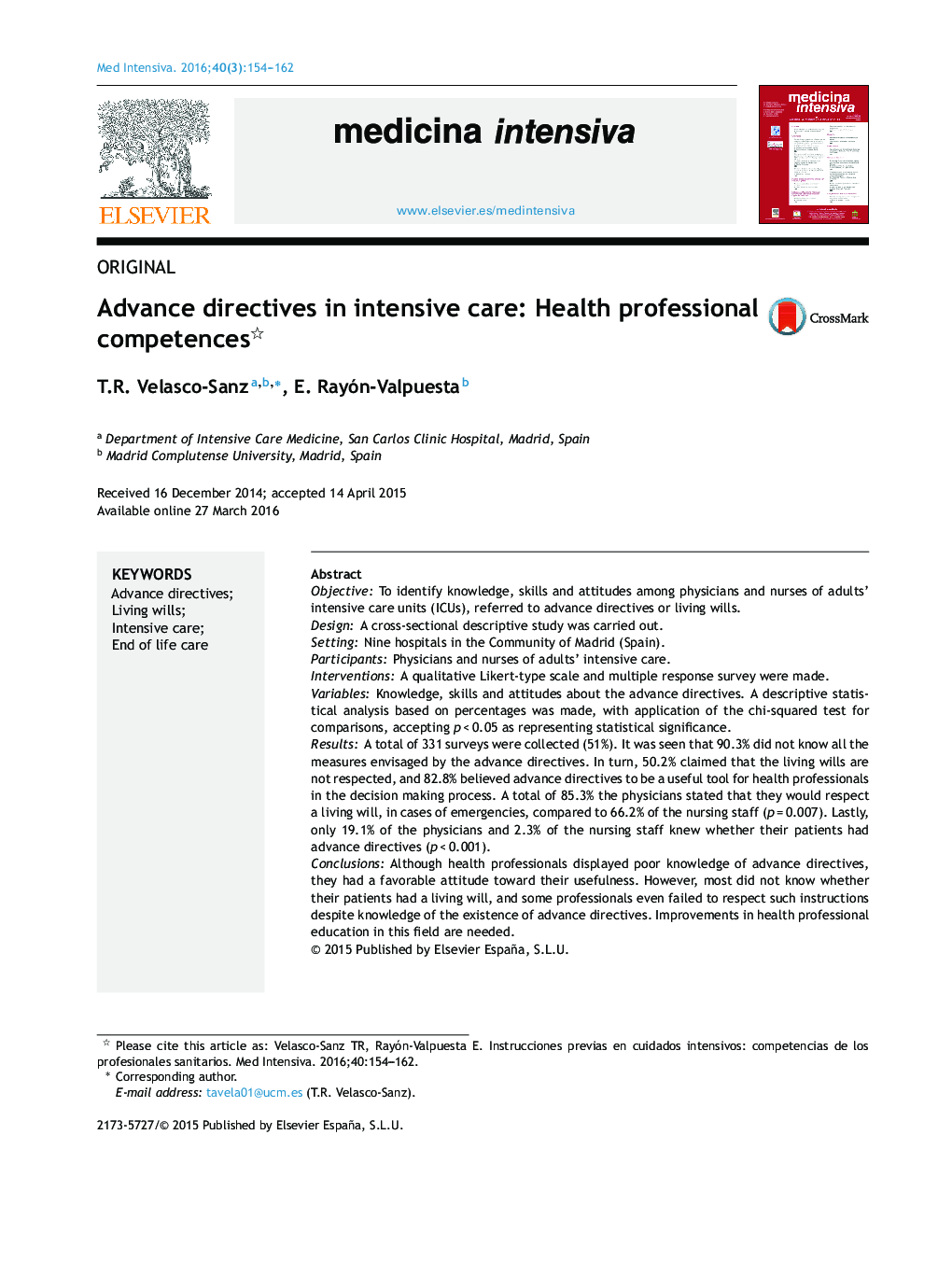| کد مقاله | کد نشریه | سال انتشار | مقاله انگلیسی | نسخه تمام متن |
|---|---|---|---|---|
| 3113969 | 1192469 | 2016 | 9 صفحه PDF | دانلود رایگان |
ObjectiveTo identify knowledge, skills and attitudes among physicians and nurses of adults’ intensive care units (ICUs), referred to advance directives or living wills.DesignA cross-sectional descriptive study was carried out.SettingNine hospitals in the Community of Madrid (Spain).ParticipantsPhysicians and nurses of adults’ intensive care.InterventionsA qualitative Likert-type scale and multiple response survey were made.VariablesKnowledge, skills and attitudes about the advance directives. A descriptive statistical analysis based on percentages was made, with application of the chi-squared test for comparisons, accepting p < 0.05 as representing statistical significance.ResultsA total of 331 surveys were collected (51%). It was seen that 90.3% did not know all the measures envisaged by the advance directives. In turn, 50.2% claimed that the living wills are not respected, and 82.8% believed advance directives to be a useful tool for health professionals in the decision making process. A total of 85.3% the physicians stated that they would respect a living will, in cases of emergencies, compared to 66.2% of the nursing staff (p = 0.007). Lastly, only 19.1% of the physicians and 2.3% of the nursing staff knew whether their patients had advance directives (p < 0.001).ConclusionsAlthough health professionals displayed poor knowledge of advance directives, they had a favorable attitude toward their usefulness. However, most did not know whether their patients had a living will, and some professionals even failed to respect such instructions despite knowledge of the existence of advance directives. Improvements in health professional education in this field are needed.
ResumenObjetivoExplorar los conocimientos, habilidades y actitudes de los médicos y enfermeras de las unidades de cuidados intensivos de adultos sobre las instrucciones previas (IP) o documento de voluntades anticipadas (DVA).DiseñoEstudio descriptivo, transversal.ÁmbitoNueve hospitales de la Comunidad de Madrid.ParticipantesMédicos y enfermeras de cuidados intensivos de adultos.IntervencionesCuestionario anónimo, autocumplimentado con variables dicotómicas y escala tipo likert.VariablesConocimientos, habilidades y actitudes sobre las IP.Análisis estadístico descriptivo con porcentajes y prueba de ji-cuadrado, tomando como significativos valores p < 0,05.ResultadosRespondieron al cuestionario 331 profesionales (tasa de respuesta del 51%). Además de los sociodemográficos, se obtuvo que el 90,3% no conoce todas las medidas que contemplan las IP. El 82,8% opina que el DVA es un instrumento útil para los profesionales en la toma de decisiones. El 50,2% opina que los DVA no se respetan. El 85,3% de los médicos respetaría el DVA de un paciente en caso de urgencia vital, frente al 66,2% de las enfermeras (p = 0,007). Solo el 19,1% de los médicos y el 2,3% de las enfermeras conoce si los pacientes que llevan a su cargo poseen un DVA (p < 0,001).ConclusionesAunque los profesionales sanitarios muestran conocimientos escasos sobre las IP, presentan una actitud favorable hacia su utilidad. Sin embargo, la mayoría no conocen si los pacientes que están a su cargo poseen un DVA e incluso algunos profesionales a pesar de conocerlo, en caso de urgencia vital no lo respetarían. Se hace necesaria una mayor formación sobre las IP.
Journal: Medicina Intensiva (English Edition) - Volume 40, Issue 3, April 2016, Pages 154–162
